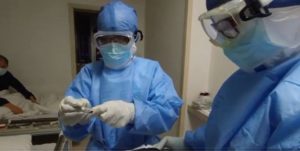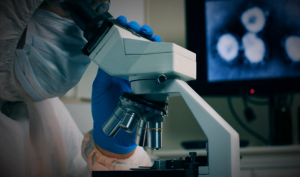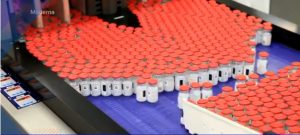
Sky News: Doctors in Thailand have told Sky News they are seeing a worrying growth of antibiotic-resistant infections – with some warning of a “collapse of the modern medical system” if urgent action is not taken.
It comes as health ministers from across Asia prepare to present a new regional action plan to G7 leaders when they meet in Japan later this month.
Overuse of antibiotics globally is believed to be accelerating the mutation and spread of bacteria that are resistant, severely reducing the effectiveness of the drugs that transformed medicine when discovered nearly 90 years ago.
At a children’s hospital in Bangkok, associate professor of paediatrics Dr Warunee Vandepitte told Sky News that each month she is seeing children die from infections that until recently have been treatable.
“We really need everyone to get involved to prevent this crisis,” she said.
“Because if we don’t do anything about this, we will have a collapse of the modern medical system.
“You will no longer have intensive care available, you cannot have transplants, you cannot have surgical management.
“Even caesarean sections could become a life sentence – because if you open up the body you need antibiotics to prevent infections during surgery.”
Researchers say the problem of anti-microbial resistance is particularly acute in India and China, but is also prevalent throughout South East Asia – and in a globalised world, drug resistant infections are extremely difficult to contain.
Thailand already invests significant amounts of public money in awareness campaigns about the dangers of over-use of antibiotics, as well as research into the kind of resistance that is being encountered in patients.
But despite government plans to tackle the problem being in place for years, doctors warn the continued sale of antibiotics over the counter without prescription increases the risk of improper use, and bacteria mutating.
Dr Kumthorn Malathum, an infectious disease specialist from Ramathibodi Hospital in Bangkok, said: “Instead of two pills they take one pill.
“This is worse than taking two days instead of five days because you take lower than the normal amount required to kill off the bacteria, so that makes the bacteria resistant to the drug you are taking.”
The president of the Infectious Diseases Association of Thailand, Dr Terapong Tantawichien, told Sky News he believed over-the-counter sales should be banned, and underlined the need for continued public awareness across the board.
“People in Asia want to get the drug that will cure the illness, and that often means antibiotics,” he said.
“When they go to the doctor or the drugstore, they want to get antibiotics, but we have to educate our people about antibiotic use.”
As well as human over-consumption, the use of antibiotics in animal feed has been identified as a major issue.
About 70% of antibiotics produced globally are believed to be used in animal rearing for meat.
Dr Chanwit Tribuddharat runs a laboratory that examines samples of resistant bacteria in an effort to determine the origin.
He says there are growing signs that consumption of food contaminated with antibiotic-resistant bacteria is having an impact on humans.
“Everywhere in the world they (farmers) will give some antibiotics as a feed supplement to keep the animal healthy, but they do not foresee the problem behind it,” he said.
“The animal may become the carrier of resistant bacteria … then there may be contamination of the antibiotic-resistant bacteria into the food chain.”
In Thailand, scientists have estimated that anywhere between 10,000 and 35,000 deaths each year are the result of antibiotic-resistant infections.
In countries such as India and China, the numbers are thought to be higher still.
The global threat of antibiotic resistance was recently highlighted by Chancellor George Osborne at a meeting of the International Monetary Fund in New York, where he said by 2050 it could kill more people than cancer.
Mr Osborne warned it was an economic as well as a public health threat, and urged drug manufacturers to work to develop new antibiotics with greater urgency.
But Dame Sally Davies, chief medical officer for England, told Sky News the industry is not doing anywhere near enough.
“The industry has stopped investing in it because they don’t see that they’d generate enough profit from it,” she said.
“This is a global problem. Global travel moves the issue around. It will need a global solution.
“But it’s not a one off. We need new antibiotics now, and our children will need new antibiotics, and then our grandchildren. This is with us forever.”




